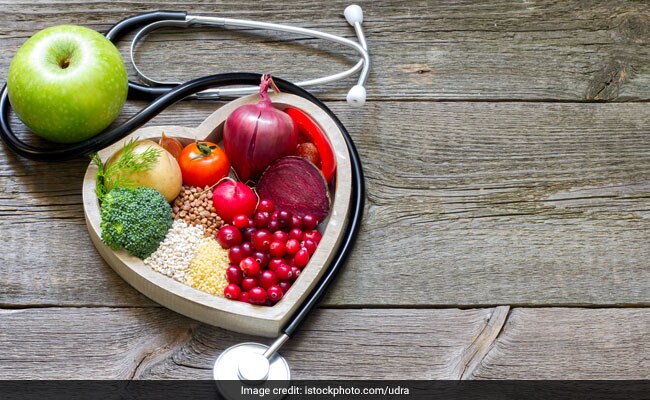There are many myths about diabetics and the diet that they should follow. Experts suggest that diabetics should have a healthy diet based on the available facts.

Diabetics should follow a healthy diet
HIGHLIGHTS
- There are many myths about the diet that diabetics should have.
- Diabetics should have healthy diet based on scientific facts.
- Strict diet is not recommended to people suffering from diabetes.
There are many misconceptions regarding diabetes and what kind of diet to be taken. It's often believed that diabetics should follow a strict diet, but in reality that's not true. One needs to make healthy choices based on available facts and not myths. For diabetes control one does not have to go on extreme diets which have very little scientific evidence and may harm our organ system.
Myths about diet in diabetes are plentiful and prevalent, below are some of the more popular myths that are currently circulating.
1. Myth: Ghee is good
Ghee has 68% saturated fatty acids. Saturated fatty acids increase total serum cholesterol levels, leading to adverse changes in structure of arteries. Hence ghee consumption is more likely to lead to blocking of arteries. A mixed use of ghee and other hydrogenated oils in cooking increases the risk of heart attack 4 times in young South Asian adults in UK, a greater risk than that seen with diabetes and chronic smoking. Further when rats were fed ghee for a period of four months, the internal lining of the major heart linked artery (aorta) rapidly increased in size, hardened, and started rapidly getting damaged, thereby seriously increasing the likelihood of blockages.
As far as Indians are concerned, saturated fatty acids (SFAs) should provide no more than 10% of total energy of the food/day. American Heart Association (AHA) Advisory, advises replacing saturated fats with polyunsaturated fats (Safflower oil, Sunflower oil, soyabean oil) and monounsaturated vegetable oils (Olive oil, Mustard oil, Canola oil) which reduces the risk of cardiovascular disease by approximately 30%. The shift from saturated to unsaturated fats should occur simultaneously in an overall healthful dietary pattern.
2. Myth: Nuts are 'hot' for the body and increase weight
There is a common belief that overeating of nuts can cause excessive heat in the body and cause weight gain. Nutritionally the myth does not stand true. Nuts are highly rich in proteins, vitamin E, dietary fibre and omega-3 polyunsaturated fatty acids. Study done by Gulati et al. in Indians with Type 2 diabetes showed that almonds consumption as part of a healthy diet decreased cholesterol, serum triglycerides, improved HbA1c (average blood sugar level for past 2-3 months) and lead to better overall health. No weight gain was observed with one handful of nuts (28g) recommended per day. Another study done in Indians on pistachios by Gulati et al. showed that eating Pistacio nuts reduced abdominal fat, cholesterol levels in individuals at high risk of diabetes
3. Myth: Having a gluten free diet reduces weight and is good for health
Avoiding gluten is crucial for people with celiac disease. Gluten is a protein found in foods processed from wheat (like whole wheat flour) and related grains such as barley and rye. In celiac patients gluten damages the small intestine and nutrients cannot be absorbed. For general population gluten free diet is not advised as its low in fibre and enriched with fat and calories. Stoppage of gluten can ultimately lead to deficiencies in vitamins and minerals such as calcium, niacin, riboflavin, thiamine, and folate. Moreover gluten free diets can cause weight gain rather than weight loss as one tends to replace gluten with products which are high on carbohydrates, fats and low in fibre. A study from Harvard University in United States suggests that Gluten free diets can increase risk for type 2 diabetes.
4. Myth: Coconut oil is healthy for system
This is a common myth, often popularised by nutritionists and physicians also! Coconut oil contains 82% saturated fat. Because diets high in saturated fat increase risk for heart disease, American Heart Association strictly advises against the use of coconut oil. Several recent trials have shown that coconut oil significantly raises LDL cholesterol and hence heart disease risk.
5. Myth: You should eat dinner before sunset
Dinner should be at proper time around 8-9 PM daily. Early dinner (e.g. Around 5-7 PM) may lead to low levels of blood sugar at mid-night, which could be hazardous for everybody, but especially for diabetes patients who are on drugs or insulin therapy.
Further those on insulin therapy should take bed time snack (a cup of milk and 8-10 almonds) as well.
(Bhavya Munjal is clinical nutritionist and a certified diabetes educator, Fortis-C-DOC Centre of Excellence for Diabetes, Metabolic Diseases and Endocrinology)Dr. Anoop Misra is chairman, Fortis-C-DOC Centre of Excellence for Diabetes, Metabolic Diseases and Endocrinology; chairman, National Diabetes, Obesity and Cholesterol Foundation (N-DOC); director, Diabetes and Metabolic Diseases, Diabetes Foundation (India) (DFI))
Disclaimer: This content including advice provides generic information only. It is in no way a substitute for qualified medical opinion. Always consult a specialist or your own doctor for more information. NDTV does not claim responsibility for this information.
DoctorNDTV is the one stop site for all your health needs providing the most credible health information, health news and tips with expert advice on healthy living, diet plans, informative videos etc. You can get the most relevant and accurate info you need about health problems like diabetes, cancer, pregnancy, HIV and AIDS, weight loss and many other lifestyle diseases. We have a panel of over 350 experts who help us develop content by giving their valuable inputs and bringing to us the latest in the world of healthcare.














